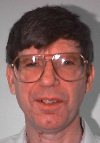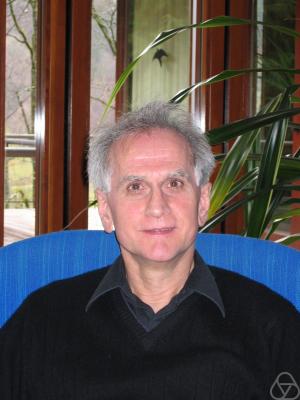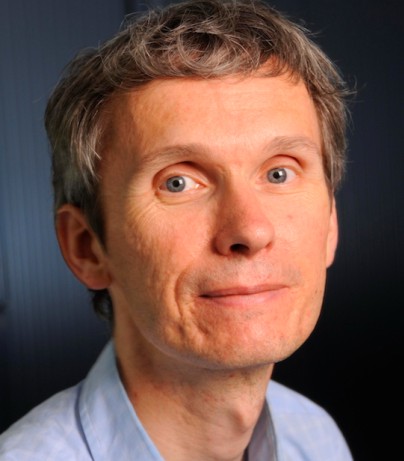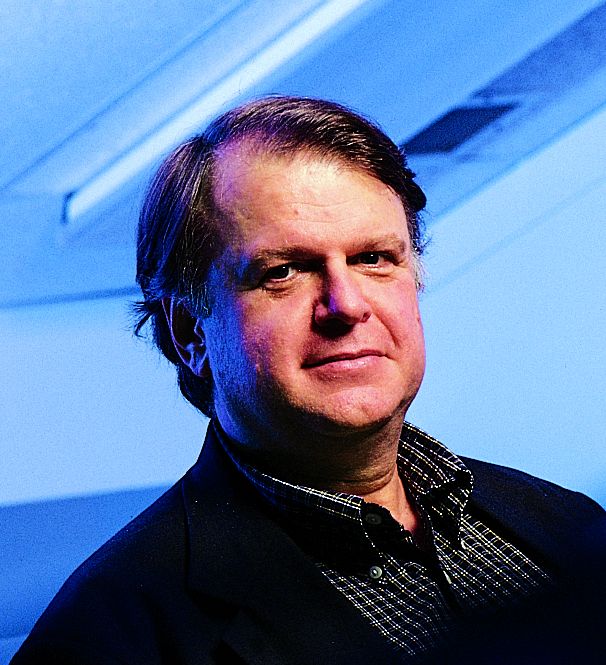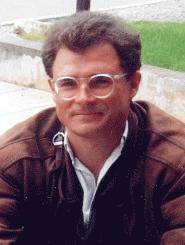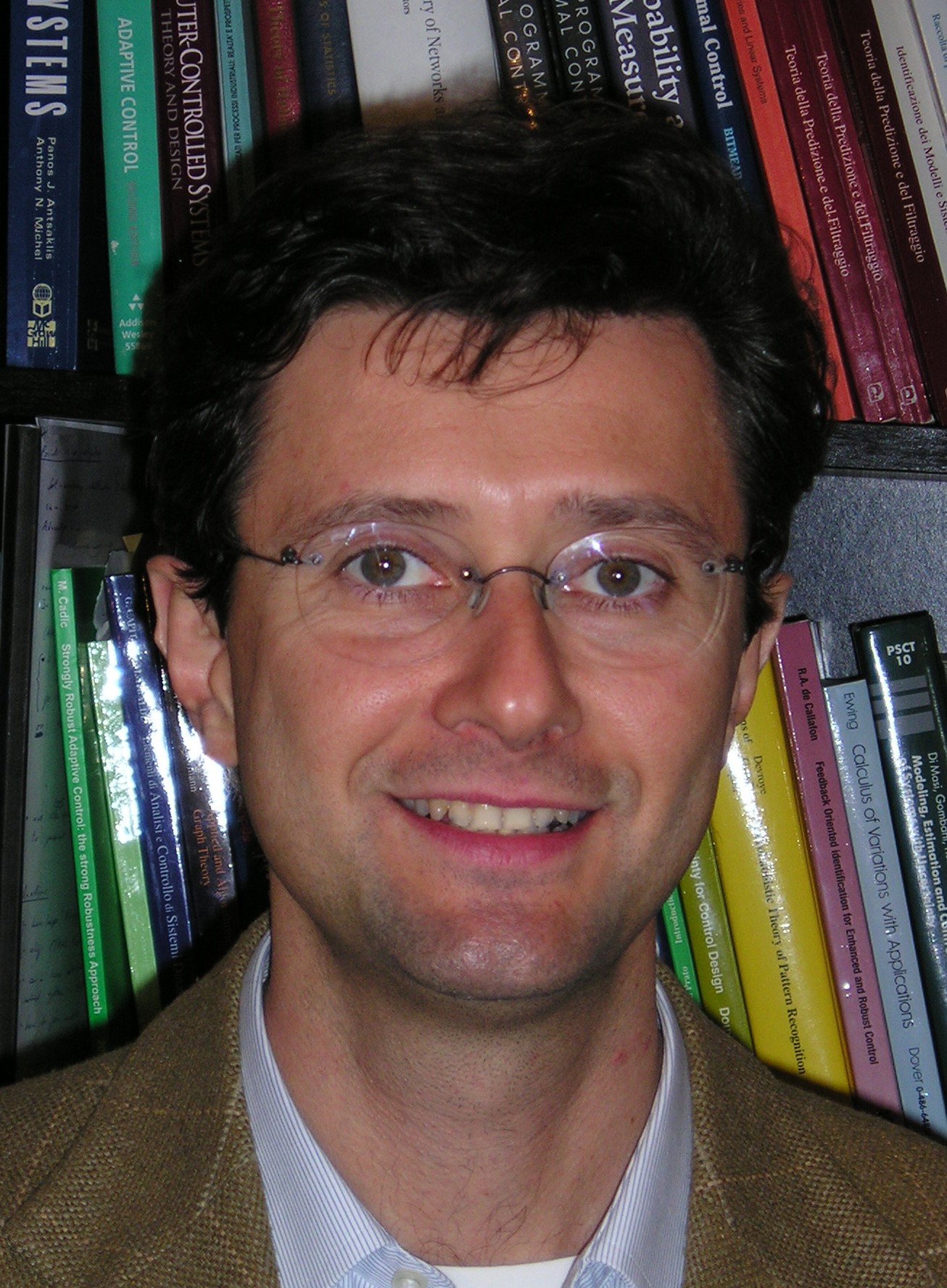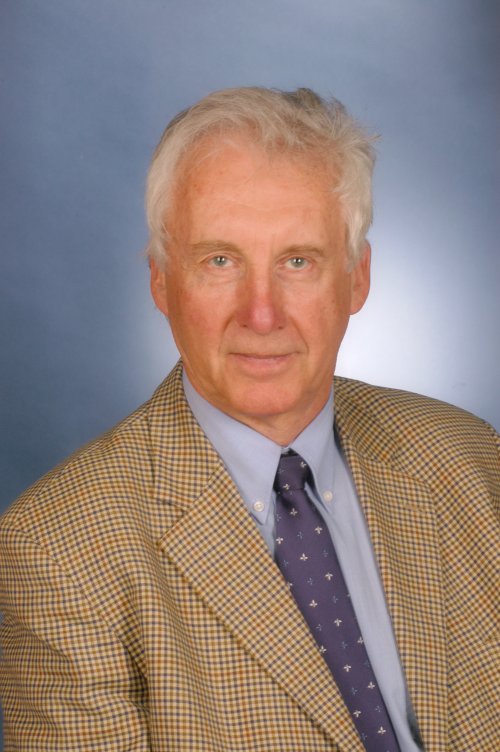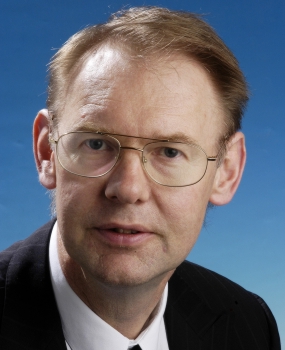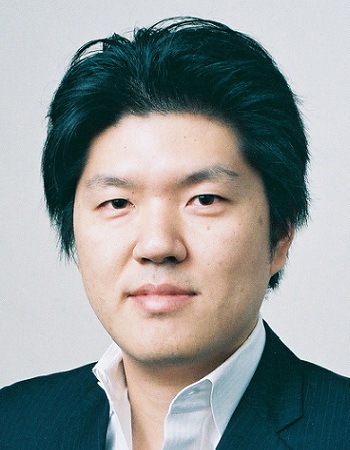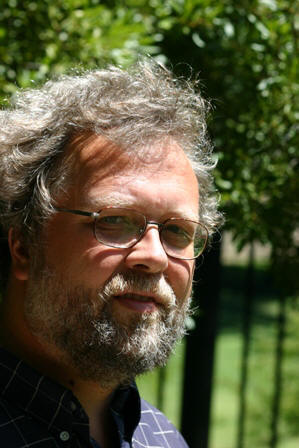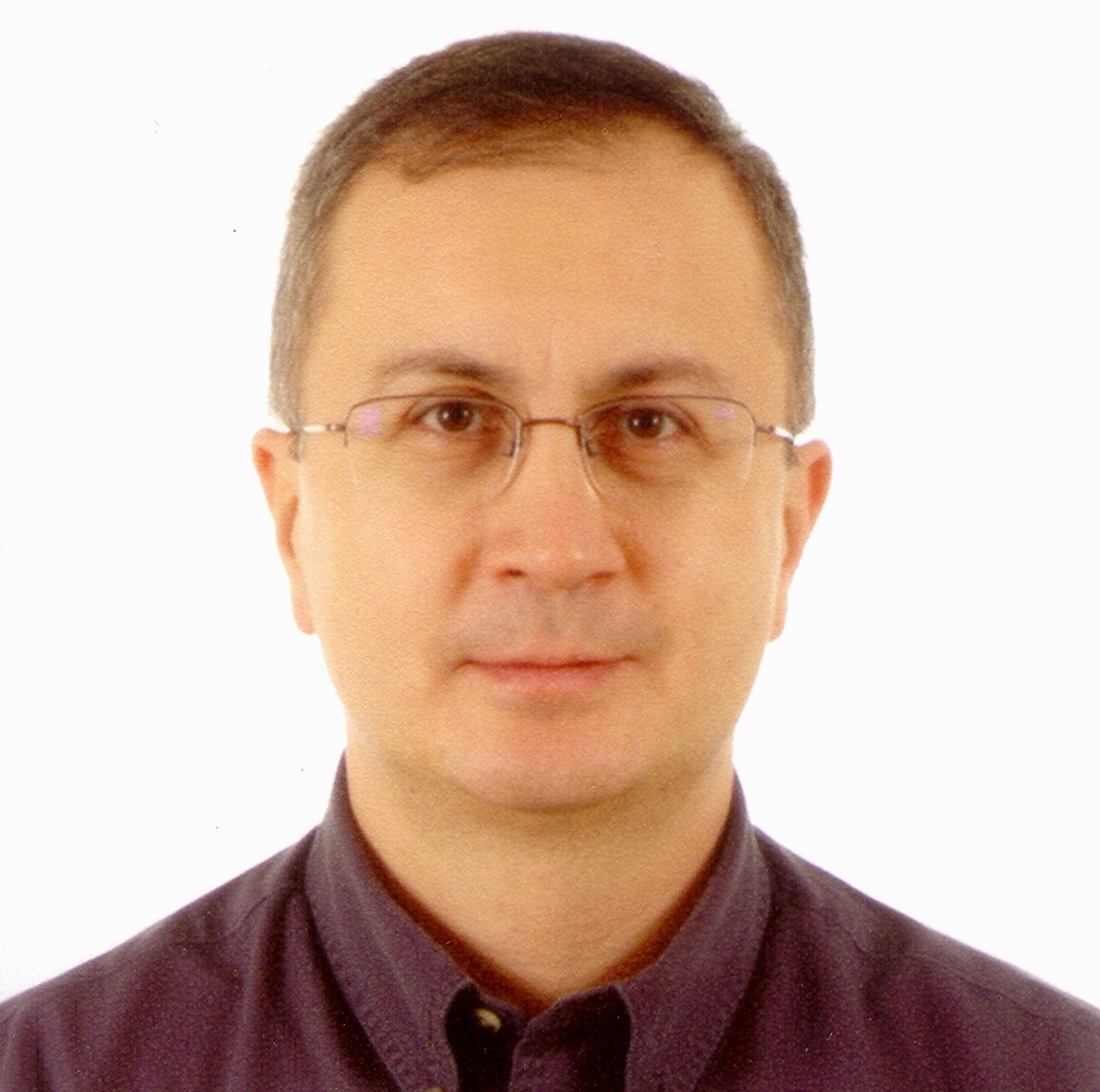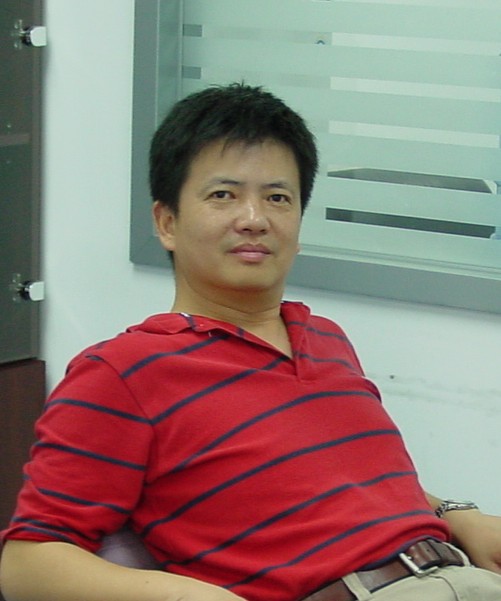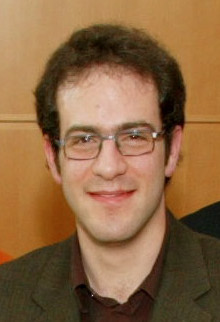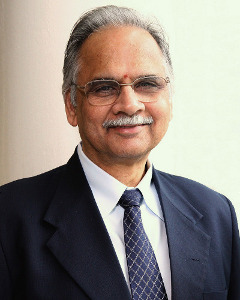Plenary speakers
Plenary speakers
|
Joseph Ball (Bio)
(Department of Mathematics, Virginia Tech, USA)
Robust Control, Multidimensional Linear Systems and Multivariable Nevanlinna-Pick Interpolation |
|
Béla Bollobás (Bio)
(University of Memphis, Department of Mathematical Sciences, USA, University of Cambridge, UK)
Models of Real-World Networks: Inhomogeneous Random Graphs and Convergent Graph Sequences |
|
Plenary session in memory of Christopher I. Byrnes (Bio)
|
|
 |
He passed away with tragic suddenness in February 2010. |
|
|
Heide Gluesing-Luerssen (Bio)
(University of Kentucky, Department of Mathematics, USA)
Codes, Trellis Representations and the Interplay of System Theory and Coding Theory |
|
Hidde de Jong (Bio)
(INRIA Grenoble-Rhône-Alpes, Bioinformatics and Biological Modeling Group, France)
From Qualitative to Quantitative Models of Bacterial Regulatory Networks |
Distinguished lecturer
|
László Lovász (Bio)
(President of International Mathematical Union)
The mathematical challange of large networks |
Semi-plenary speakers
|
John Baras
(University of Maryland, Department of Electrical and Computer Engineering, USA)
Dynamic "Magic" Graphs in Cooperative Networked Systems |
|
Laurent Baratchart
(INRIA, Sophia Antipolis, France)
Orthogonal Rational Functions and the Multipoint Schur Algorithm: a Szego Theory |
|
Vivek S. Borkar
(Tata Institute of Fundamental Research, India)
Learning Algorithms for Risk-sensitive Control |
|
Marco C. Campi
(University of Brescia, Department of Electronics for Automation, Italy)
Variable Robustness Control: Principles and Algorithms |
|
Manfred Deistler
(Vienna University of Technology, Austria)
Modelling High Dimensional Time Series by Generalized Factor Models |
|
Magnus Egerstedt
(Georgia Institute of Technology, School of Electrical and Computer Engineering, USA)
Control of Cooperative Systems: From Controllability to Optimal Control |
|
Ian R Petersen
(School of Engineering and Information Technology, University of NSW at the Australian Defence Force Academy)
Quantum Linear Systems Theory |
|
Kenji Kashima
(Tokyo Institue of Technology, Department of Mechanical and Environmental Informatics, Japan)
Smith-Predictor Type Structure for a Class of Infinite-Dimensional Systems: Optimal Control and Performance Limitation Formula
|
|
Raimund Ober
(University of Texas at Dallas, Department of Electrical Engineering, USA)
Challenges of Tracking Single Molecules in Live Cells |
|
Hitay Özbay
(Bilkent University, Dept. of Electrical and Electronics Eng., Turkey)
Coping with Time Delays in Control of Networks |
|
Li Qiu
(Hong Kong University of Science and Technology, Department of Electronic and Computer Engineering, Hong Kong SAR, China)
Quantify the Unstable |
|
Malcolm C. Smith
(University of Cambridge, Department of Engineering, UK)
Synthesis of Electrical and Mechanical Networks |
|
Ramon van Handel
(Princeton University, USA)
Asymptotic Stability in Nonlinear Filtering: the Role of Stochastic Systems Theory |
|
Mathukumalli Vidyasagar
(University of Texas at Dallas, Erik Jonsson School of Engineering & Computer Science, USA)
Mathematical Finance with Heavy-Tailed Distributions |
| |
George Weiss
(Tel-Aviv University, Israel)
Control of Grid-Connected Power Converters |
Biographies
Joseph Ball
Joseph A. Ball was born in Washington, DC in 1947. He received the B.S. degree in mathematics from Georgetown University, Washington, DC, in 1969, and the M.S. and Ph.D. degrees in mathematics from the University of Virginia, Charlottesville, in 1970 and 1973, respectively.
He joined the faculty at Virginia Tech, Blacksburg, in 1973, where he is currently Professor of Mathematics. Short term visits elsewhere include at the University of California at San Diego, the Weizmann Institute of Science in Israel, the University of Maryland in College Park, the Vrije Universiteit in Amsterdam, the Mathematical Sciences Research Institute in Berkeley, and the Mittag-Leffler Institute in Djursholm, Sweden.
Dr. Ball is currently an Associate Editor for the journals Integral Equations and Operator Theory, Journal of Mathematical Analysis and Applications, and Complex Analysis and Operator Theory, and is a member of the MTNS Steering Committee. His current interests include multivariable function theory and operator theory and their connections with multidimensional systems and robust control theory.
Top
Béla Bollobás
Béla Bollobás is a Hungarian-born British mathematician who has worked in various areas of mathematics, including functional analysis, combinatorics, graph theory and percolation. As a student, he took part in the first three International Mathematical Olympiads, winning two gold medals. He has been a Fellow of Trinity College, Cambridge since 1970. In 1996 he was appointed to the Jabie Hardin Chair of Excellence at the University of Memphis, and in 2005 he was awarded a Senior Research Fellowship at Trinity College.
In addition to over 350 research papers on mathematics, he has written several books, including the research monographs "Extremal Graph Theory", "Random Graphs" and "Percolation" (with Oliver Riordan), the introductory books "Modern Graph Theory", "Combinatorics" and "Linear Analysis", and the collection of problems "The Art of Mathematics - Coffee Time in Memphis", with drawings by Gabriella Bollobás. He has also edited a number of books, including "Littlewood's Miscellany".
Béla Bollobás has had a great many research students, including Andrew Thomason, Keith Carne, Timothy Gowers (who was awarded a Fields Medal in 1998) and Imre Leader at the University of Cambridge, Alexander Scott and Oliver Riordan at Oxford, Jonathan Partington and Charles Read at Leeds and Keith Ball and Graham Brightwell in London. He is a Foreign Member of the Hungarian Academy of Sciences; in 2007 he was awarded the Senior Whitehead Prize by the London Mathematical Society.
Top
Christopher I. Byrnes
Christopher I. Byrnes, Ph.D., dean of the School of Engineering & Applied Science at Washington University in St. Louis from 1991 to 2006 and the Edward H. and Florence G. Skinner Professor Emeritus of Systems Science and Mathematics, died unexpectedly last week in Stockholm, Sweden. He was 60.
Byrnes, a resident of Ballwin, Mo., was a distinguished visiting professor in optimization and systems theory at the Royal Institute of Technology in Stockholm at the time of his death.
Byrnes joined the WUSTL faculty in 1989 as professor of systems and control and chair of the Department of Systems Science and Control. He became the eighth dean of the School of Engineering & Applied Science on July 15, 1991,
Byrnes' field of scholarship was systems science and control. Among his research interests were feedback design in automatic control, nonlinear dynamics and control, and statistical estimation and filtering. His research found application in electrical power systems, signal processing and speech synthesis, among other areas. He held four U.S. patents and received more than $5 million in competitively awarded grants.
Byrnes joined the Harvard University faculty in 1978 as an assistant professor and was promoted in 1983 to associate professor. He also taught at Arizona State University, where he founded the Center for Systems Engineering Research. At various times, he held visiting appointments at institutions in Europe, Japan and the former Soviet Union, as well as in the United States.
Byrnes was awarded an honorary doctor of technology degree by Sweden’s Royal Institute of Technology in 1998. He was an adjunct professor at the institute from 1986 to 1990 and a visiting professor in 1985, 1991, and 2001. In 2001, Byrnes was installed as a foreign member of the Royal Swedish Academy of Engineering Sciences.
A fellow of the Institute for Electrical and Electronics Engineers, Byrnes won many best-paper awards, including the George Axelby Prize, which he received twice, and an award from the International Federation for Automatic Control.
In 2005 he received the W.T. and Idalia Reid Prize for excellence in the field of differential equations and control theory, and in 2008 he won the IEEE Hendrik W. Bode Lecture Prize for fundamental contributions to algebraic and geometric approaches to systems and control. He was the author or editor of several hundred technical articles and books.
Top
Heide Gluesing-Luerssen
Heide Gluesing-Luerssen received the Ph.D. degree from the University of Bremen (Germany) in 1991 and the habilitation degree from the University of Oldenburg (Germany) in 2000. Both degrees are in Mathematics. After a postdoctoral fellowship at the Mathematics Department of the University of Bremen from 1991 to 1993 she joined the University of Oldenburg where she served as faculty member in the Mathematics Department until 2004. From 2004 until 2006 she was a faculty member in the Department of Mathematics at the University of Groningen (The Netherlands). In 2007 she joined the Department of Mathematics at the University of Kentucky (Ky./USA) as a faculty member. She held visiting positions at the University of Notre Dame (Ind./USA) in 1997--1999, at the University of Magdeburg (Germany) in 2002, and at the University of Kentucky (Ky./USA) in the academic year 2003/2004. Her research interest is focused on the mathematical theory of convolutional codes as well as on algebraic systems theory.
Currently she serves as Corresponding Editor for SIAM Journal on Control and Optimization and as Associate Editor for Advances in Mathematics of Communications.
Top
Hidde de Jong
Hidde de Jong obtained MSc degrees in Computer Science, Philosophy of Science, and Management Science from the University of Twente (the Netherlands) and completed a PhD thesis in Computer Science at the same university. He joined INRIA in 1998 and is currently a senior research scientist at INRIA Grenoble-Rhône-Alpes and head of the IBIS group. He has been a member of the editorial board of the IEEE/ACM Transactions on Computational Biology and Bioinformatics and the Journal of Mathematical Biology.
Top
László Lovász
László Lovász was born on March 9, 1948 in Budapest, Hungary. He obtained his doctoral degree in mathematics from the Eötvös Loránd University, in Budapest, Hungary in 1971. He is a member of the Hungarian Academy of Sciences and several other Academies.
Currently he is Director of the Institute of Mathematics at the Eötvös Loránd University in Budapest.
He is recipient of the Wolf Prize, the John von Neumann Theory Prize, the Bolyai Prize, and the Széchényi Grand Prize. He is President of the International Mathematical Union. His field of research is discrete mathematics, in particular its applications to the theory of algorithms and the theory of computing, and its interactions with classical mathematics.
Top
